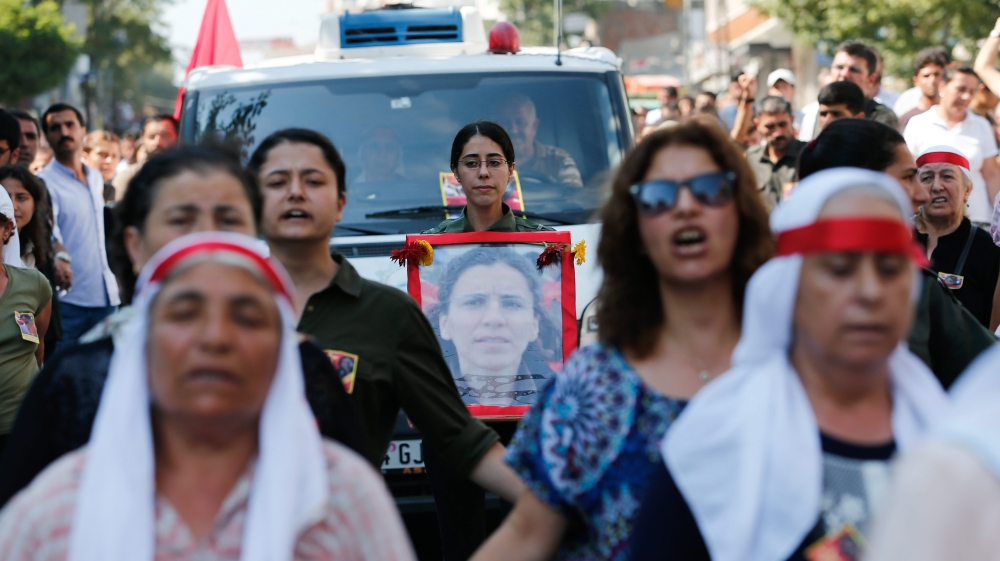A Turkish/U.S./Kurdish Alliance?
"Moderate forces like the Free Syrian Army will be strengthened, a structure will be created so that they can take control of areas freed from ISIL, air cover will be provided.""It would be impossible for them [Syrian rebels] to take control of the area without it."
Turkish Prime Minister Ahmet Davutoglu
Unfortunately, that brand of Sunni Islamism has proven to be a threat to any semblance of reasonable moderation and effective administration of the country's residents. It solves the problems relating to caution and distaste for its 'pure Islam' that indulges in wholesale atrocities against those of too-little faith, or the wrong faith, tribe, ethnic group or culture by casually destroying those opposed to its rule, or whose presence is seen to insult its rule.
One might conceive from this that the Turkish administration of President Erdogan found it loathsome to cast its lot in with Islamic State jihadis and their fierce barbarism but there has been nothing out of Ankara to support that contention. Confrontation by Turkish forces against Islamic State appears to be a byproduct of the tardy realization that they now comprise a threat to Turkish peace. Although Turkey doesn't mind disturbing its peace when it comes to imposing conflict on its Kurds.
President Erdogan's raging distrust and hatred against Kurds, those in Turkey, in Syria and Iraq [perhaps those in Iran haven't come to his notice yet], identifies them as Turkey's most important threat. The 30-year conflict between the Turkish administration and its Kurdish minority seeking a degree of sovereignty at least and the possibility of a future national home at the very most, has never been settled, despite a temporary accommodation to end the mutual violence.
President Erdogan amply demonstrated the esteem in which Kurds are held by Turks through the regime's choice to allow bloodthirsty Islamic State jihadists to lay siege to and destroy the border Syrian Kurdish town of Kobani, even if it meant that thousands of its desperate civilian residents were forced to cross the border into Turkey for respite from the fighting and temporary haven from violation of all normative caution against taking civilian lives in conflict situations.
Finally, Turkey has agreed to take part in the U.S.-led airstrikes against Islamic State positions, and to permit the United States and its allies to use the Incerlik air base to aid in nearer proximity to bombing missions. The two countries have agreed to the need to roust ISIL from Syrian territory along the border with Turkey. Unfortunately that plan comes up hard against the reality that most of the border is held by Syrian Kurdish forces.
While the YPG, loathed by Turkey, is in effective possession of 910 kilometres of border territory between Turkey and Syria, Islamic State controls a 100-km stretch of the border, wedged between Islamist insurgents and Kurdish Peoples Protection Unit, the YPG. The YPG, affiliated with the Kurdish Workers' Party (PKK) whose insurgency in Turkey caused the country to label it a terrorist group views Ankara's plan for the border as a disguised effort to dislodge the Kurdish hold on the border.
Things become somewhat complicated by the fact that the United States views the Kurdish fighters as their only competent allies in the battle against Islamic State. Should the plan by Ankara be placed into effect, it would limit the Syrian Kurdish forces' advance; the war against ISIL used as a pretext to influence Washington not to work in tandem with the YPG. Nawaf Khalil who heads the Kurdish Center for Studies based in Germany comments that "this will not work".
 |
| Thousands of Kurds in Turkey and elsewhere have protested against Turkey's shelling of Kurdish targets [EPA] |
As for Mevlut Cavusoglu, Turkey's Foreign Minister, "There is no difference between PKK and Daesh", he spat, placing things in their Turkish-viewed perspective. Justifying Turkish attacks against Kurdish emplacements. At the same time a State Department spokesman in Washington stated that no joint military effort alongside Turkey is to include a no-fly zone in Syria to halt its government air raids.
For doing so, it is feared, might draw American forces into the civil war.
Turkey called for an urgent meeting with NATO allies, concerned over its security and its airstrikes. "NATO has a duty to protect" Turkey's border with Syria and Iraq, Turkey insists. Again, the situation is such that it comes up against the U.S.-supported Kurdish fighters in Syria, the most successful of all those involved in the battle against Islamic State.
Labels: Conflict, Islamic State, Kurds, Turkey, United States

<< Home